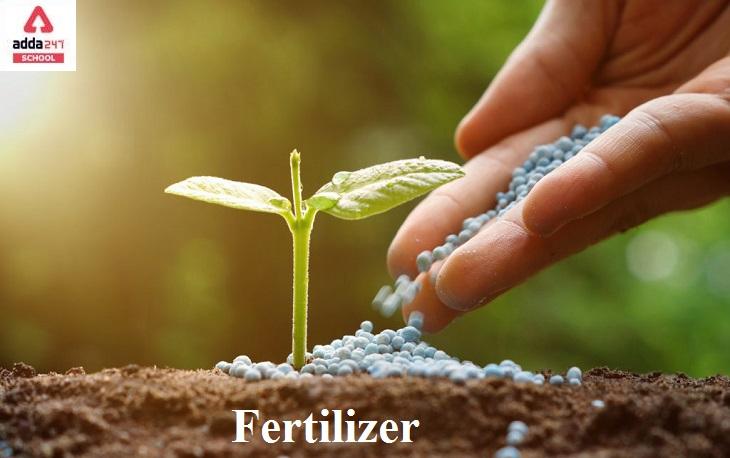What are Fertilizers?
What are Fertilizers?- Definition, Types, Meaning, Examples are discussed here in this article. Any natural or manufactured item that is applied to soil or plant tissues to offer plant nutrients is known as a fertilizer. Fertilizer comes in a range of natural and synthetic forms.
Fertilizer’s Meaning and Definition
Fertilizer is something that ‘fertilizes land’. The term, fertilizer, is derived from the Latin ‘Fertilis’, which means “abundantly bearing, prolific, or productive.” Animal dung or peat is the most frequent organic fertilizer, whereas other fertilisers are made up of specific components like nitrogen or potassium.
The Cambridge English Dictionary defines fertilizers as “A natural or chemical substance that is spread on the land or given to plants, to make plants grow well.”
Read About Special Economics Zones
Fertilizer Definition: A look at the History
For thousands of years, farmers have been concerned with soil fertility management. Minerals or manure were used by Egyptians, Romans, Babylonians, and early Germans to increase the productivity of their fields. Plant nutrition research predates the work of German scientist Justus von Liebig, though his name is frequently referenced. Justus von Liebig’s conclusions were quickly disproved by Nicolas Théodore de Saussure and his scientific colleagues at the time. There existed a complicated scientific understanding of plant nutrition, with a focus on hummus and organo-mineral interactions, that was consistent with more recent discoveries beginning in 1990.
Carl Ludwig Sprenger and Hermann Hellriegel were two prominent scientists on whom Justus von Liebig drew. In this discipline, there has been a ‘knowledge erosion,’ fueled in part by the merging of economics and research. In 1837, an English entrepreneur named John Bennet Lawes began experimenting on the effects of various manures on plants growing in pots, and a year or two later, the trials were expanded to include field crops. One immediate result was that he patented manure made by processing phosphates with sulfuric acid in 1842, establishing the artificial manure business for the first time.
Read About India Post Payment Bank
Fertilizers Meaning, Types & Examples
NPK Fertilizers
NPK stands for nitrogen (N), phosphorus (P) and potassium (K). For the production of NPK fertilisers, there are four major routes: Steam granulation, chemical granulation, compaction, and bulk blending are the four methods of granulation. Compound NPKs are made using the first three methods. Raw materials are combined and further granulated using steam as a binding agent during steam granulation. Chemical granulation is a process between liquid and solid raw materials (for example, phosphoric acid, sulphuric acid, and ammonia) (such as potassium chloride, recycle material). To agglomerate dry powder materials, compaction uses high pressure. Finally, bulk mixes are made by combining several types of fertilisers.
Read About Food Chain
Fertilizers Types & Examples
1. DAP Fertilizers
2. NPK Fertilizers
3. Urea Fertilizers
DAP (Di-ammonium Phosphate) is a common fertiliser in India because it contains both Nitrogen and Phosphorus, which are both main macronutrients and part of a set of 18 important plant nutrients.
DAP is a fertiliser grade product that contains 18% nitrogen and 46% phosphorus (P2O5). DAP is made in fertiliser facilities by reacting ammonia with phosphoric acid under regulated conditions.
Because of its outstanding physical qualities and nutrient content, it is a very popular fertiliser. It’s free-flowing, dust-free, and doesn’t usually cause storage issues. DAP is nearly water-insoluble and, as a result of the ammonia, it contains, has an acidic effect on soils. When DAP is incorporated into the soil, it interacts with water to form HPO4 and NH4. The same paths as urea are followed by ammonium (NH4). Phosphorus is contained in DAP in the best accessible form (HPO4). Phosphorus exists in three forms that can be taken by plant roots, depending on the soil response (pH). HPO4, H2PO4, and PO4 are the three. Leaching losses are not experienced by phosphorus, which is immobile in soil.
What are Fertilizers?- FAQs
What is fertilizer?
Fertilizers are chemicals that are mixed in the soil to benefit the crops and in order to boost their yield. Farmers use fertilizers frequently as to to boost crop productivity.
What is the difference between the two types of fertilisers?
Inorganic and organic fertilisers are the two types of fertilisers. All sorts of fertilisers, in the broadest sense, are any living or inorganic substance that aids in plant growth and health.
What are some of the advantages of fertiliser?
Fertilizers are essential for delivering nutrients to crops so they can grow and be collected for nutritious food. Fertilizers assist in the delivery of sufficient food to feed the world’s population.
Which fertiliser promotes faster plant growth?
Nitrate fertilisers are nitrogen-rich fertilisers. Nitrate encourages the production of more and more leaves, which helps plants grow quicker.
Is fertiliser beneficial to soil?
They improve soil health by adding organic matter, which increases water-holding capacity and cation exchange capacity. They boost microbial activity while also improving soil structure. Plants benefit from organic fertilisers since they are rich in micronutrients.









 Try CUET College Predictor 2025 to Predi...
Try CUET College Predictor 2025 to Predi...
 CUET Result 2025 OUT (Today) @cuet.nta.n...
CUET Result 2025 OUT (Today) @cuet.nta.n...
 Why the Delay in CUET UG 2025 Results? C...
Why the Delay in CUET UG 2025 Results? C...









